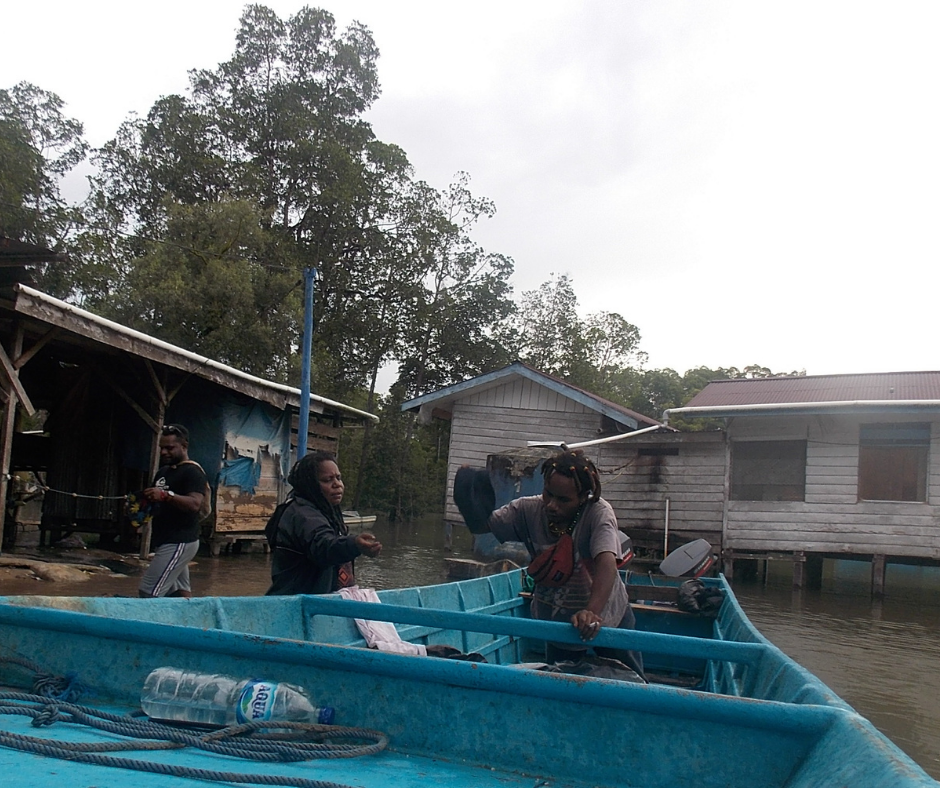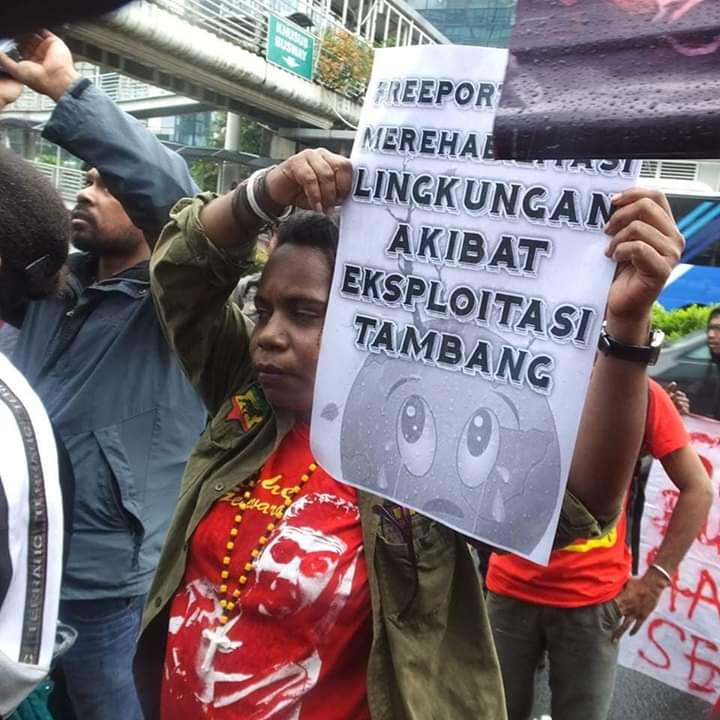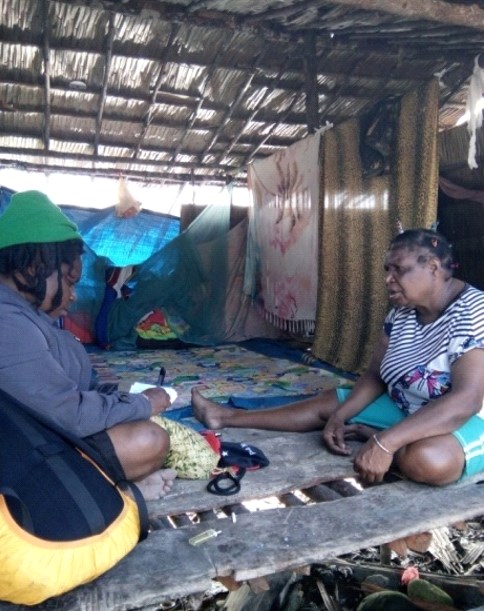“The land is our Mother”: Responding to extractive industry and COVID-19 in Indonesia
By Adolfina Kuum

Adolfina Kuum preparing to go out on the river with community members to assess water pollution issues.
Understanding women's relationships with the earth.
Adolfina Kuum, a leader in the 2020 WEA Indonesia Accelerator, is the Chairwoman of Lepemawi Timika, an organization that fights for the rights of local communities affected by mining activities in Timika in Papua Province, Indonesia. Adolfina, affectionately known as Doliy, sees water and soil as the sources of life for women in Timika.
For the people of Timika, including the local Amungme and Kamoro tribes, the land is the Mother that gives life; she is also that which produces food and a source of income that supports the economy, both at the family and community level. Similarly, water acts as a space for bonding and building relationships as the activities of women in the community are inseparable from water. The women of the Kamoro tribe often engage in foraging from the sea or river (Maranu) for crabs and fish, which are important sources of food.
Before the emergence of the mining industry, women collected drinking water directly from the river and community-owned gardens were fertile. However, since 1967 the presence of mining companies in Timika has posed severe threats to the Amungme and Kamoro tribes. Mining activities have caused both water and soil pollution. Communities have lost access to their primary local food, sago, as well as the places where they could take part in traditional hunting and gathering practices. These changes in the natural environment have negative impacts on the physical and mental health of community members, in addition to threatening to destroy the cultural heritage and traditions of the tribes.
In response, the women in Timika began organizing against mining corporations and activities in 1997. The first movement was carried out by Mama Yosepha Alomang, Mama Ema Narkime, and their friends. Together, they occupied the airport for three days as a form of protest. Since then, local women have been engaged in other activities such as building awareness, leading discussions, and educating other women from the Amungme and Kamoro tribes who are directly affected by industrial and mining waste.

Adolfina at a protest regarding exploitation of the environment due to mining activities.

Adolfina speaking to community members about their experiences and the impacts of mining.
The COVID-19 pandemic, coupled with the existing ecological crisis, has made it increasingly difficult for people, especially women, to access resources for their daily needs, including access to clean water. Decreases in income during the pandemic have also led to issues of food insecurity. However, women like Adolfina and others in her community, are working tirelessly to protect their ways of life. As Mohawk grandmother Katsi Cook has said, "Women are the first environment." What happens to the lands and waters around women's bodies is intimately connected to what happens within women's bodies. What does it mean for our relationship with land when traditional lifeways and indigenous knowledge are not acknowledged and allowed to flourish?
Since the onset of the pandemic and building upon her experience advocating against destructive industries in the region, Adolfina has conducted a series of workshops to identify and address the needs of the community. Transportation was a primary concern for many and the difficulty of accessing it in the midst of a pandemic makes it difficult for women to go to the markets to sell their produce and earn an income. Secondly, government assistance is hard to come by for many of the tribal communities. Additionally, any trainings provided by the authorities is done so with little regard for the specific needs of the community and without any continuity or follow-up.
To ensure she is receiving the support she needs to grow her reach and impact, in 2020 Adolfina participated in the Women’s Earth Alliance’s Indonesia Accelerator, which catalyzes the efforts of grassroots environmental leaders to deepen their strategies, build powerful alliances, and scale their grassroots solutions for the environment. Through this program, Adolfina and her fellow grassroots leaders received support in developing actionable strategies specific to their regions and community needs, tools in communication and resource mobilization, and mentorship for peers across Indonesia and the world.
For Adolfina, our life is the earth itself.
Apa makna tanah dan kaitannya bagi perempuan?
Dalam proses mencari tahu maknanya, kami mendapatkan kisah menarik dari Adolfina Kuum tentang bagaimana air dan tanah menjadi sumber kehidupan bagi perempuan di suku Amungme dan Kamoro. Perempuan yang akrab disapa Doliy ini merupakan Chairwoman dari Lepemawi Timika, organisasi yang memperjuangkan hak penduduk lokal yang terdampak kegiatan pertambangan.
Bagi suku Amungme dan Kamoro, tanah adalah ibu (mama) yang memberikan kehidupan. Tanah merupakan tempat bercocok tanam yang menghasilkan pangan serta sumber penghasilan yang membantu perekonomian keluarga dan masyarakat. Air pun menjadi sumber pendukung kehidupan keluarga, dimana aktivitas para ibu rumah tangga (mama-mama) tidak terpisahkan dari air. Para perempuan suku Kamoro sendiri mencari dan mengumpulkan makanan di laut atau sungai (Maranu). Bahan makanan yang kerap dikumpulkan berupa kepiting, dan ikan.
Sebelum munculnya industri pertambangan, mama-mama mengambil air minum langsung dari sungai. Kebun yang dimiliki masyarakat juga masih subur. Namun, kehadiran perusahaan tambang sejak tahun 1967 memberikan tantangan terbesar bagi suku Amungme dan Kamoro.
Tanah, laut, dan sungai mereka tercemar. Mereka kehilangan pangan lokal utama mereka, sagu. Mereka kehilangan pula tempat berburu dan mengumpulkan makanan. Perombakan alam yang mereka hadapi memberi dampak fatal bagi kesehatan dan konfisi fisik mereka. Kini, yang terjadi adalah ancaman hancurnya mitologi dan peradaban suku bangsa itu sendiri.
Menyikapi situasi ini, para perempuan memulai pergerakan mereka pada tahun 1997. Gerakan pertama dilakukan oleh Mama Yosepha Alomang, Mama Ema Narkime, beserta kawan-kawannya. Bersama, mereka menduduki bandara dan memasang tungku api selama tiga hari sebagai bentuk aksi protes. Setelah itu, gerakan lainnya bermunculan seperti diskusi dan edukasi kepada perempuan suku Amungme dan Kamoro yang terdampak limbah industri.
Sekarang, dengan situasi yang telah mereka hadapi ditambah dengan pandemi COVID-19, mama-mama makin sulit mendapatkan kebutuhan sehari-hari. Penutupan akses mempersulit mereka mendapatkan air bersih. Pendapatan pun menurun karena hasil pangan yang mereka jual di pasar tidak laku.
Melalui lokakarya untuk menyikapi masalah penjualan mama-mama, Doliy menyimpulkan beberapa hal yang menghambat mereka. Pertama adalah transportasi, sulitnya akses transportasi di tengah pandemi membuat para mama kesulitan ke pasar untuk mendapatkan konsumen yang lebih banyak.
Selain itu, pendanaan yang tidak tepat sasaran karena belum adanya aturan soal bantuan. Selanjutnya adalah tempat jualan di pasar yang sulit mereka dapatkan. Terakhir adalah kurangnya pendampingan bagi mama-mama yang ingin menunjang ekonomi keluarga. Biasanya pihak berwenang hanya menyediakan pelatihan dalam acara besar sbeagai formalitas saja tanpa ada keberlanjutan.
Kehidupan atas alam semesta yang telah rusak dan hilang tidak dapat dikembalikan. Namun, mereka berusaha memulihkan yang tersisa dari kehidupan. Sebab mereka adalah perempuan, sang pemberi kehidupan di bumi. Sayangnya, filosofi ini bahkan tidak dimaknai dengan baik karena ada budaya patriarki yang sudah mengakar pada suku Amungme dan Kamaro.
Bagi Doliy, kehidupan kita adalah bumi itu sendiri. Kita semua di kehidupan ini saling terkait, bergantung satu sama lain, dan saling berinteraksi dengan alam beserta isinya. Sebagai satu spesies, tidak peduli negara, suku, Tuhan dan asal nenek moyang darimana. Kehidupan yang tersalurkan lewat tubuh kita terbentuk dari apa yang kita konsumsi di alam ini.
